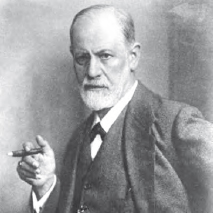Nineteenth Century PhilosophySigmund Freud |
Who was Sigmund Freud? |
Sigmund Freud (1856–1939) was the founder of psychoanalytic theory and clinical practice. He developed the idea that early childhood experience has a lifelong influence in shaping personality and character. The importance of childhood education was emphasized as early as Plato (c. 428–c. 348 B.C.E.), but Freud was the first to stress childhood emotional experience. Freud was also responsible for the popular acceptance of the idea that self-understanding does not occur immediately and automatically, but requires a special kind of reflection. The ancient Greeks are famous for the maxim, “Know Thyself,” but Freud’s distinct contribution was that there are different layers of the self to be known.
Freud’s principle works are The Interpretation of Dreams (1900), Three Essays on the Theory of Sexuality (1905), and Civilization and Its Discontents (1930). Also of particular interest in his application of his theories to healthy people in ordinary life is Psychopathology of Everyday Life (1901).

